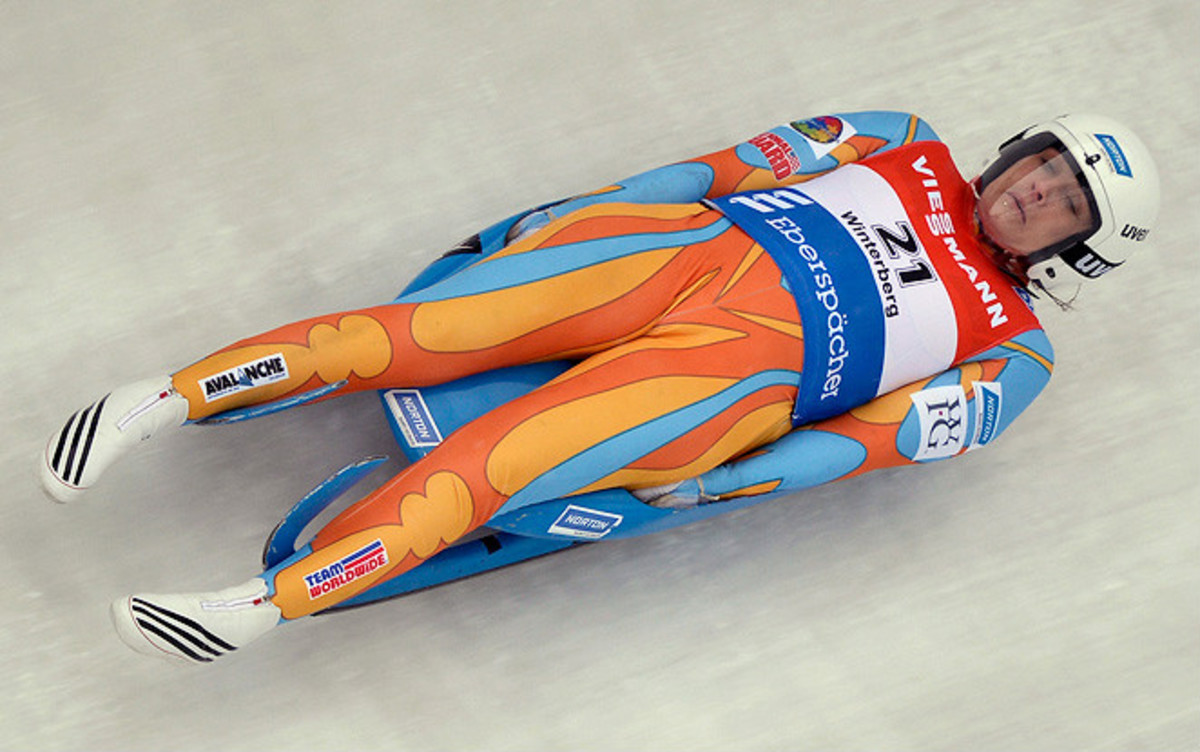Julia Clukey's return, a home for pentathlon, more Olympic Notebook
It's a tough diagnosis for an athlete who has to manage the taxing effects of G-forces pressed against the head and neck in every moment of her event, one in which places are distinguished by thousandths of seconds and a momentary lapse in concentration can knock a contender down to the back of the pack.
Clukey became aware of the signs just as her career was blossoming. She placed fifth at the world championships in Lake Placid in 2009 and, after a summer of recovery from knee surgery for a torn meniscus, took 17th at the Olympics in Vancouver in 2010. Early in the Olympic season, she began to suffer symptoms, initially choosing rest and rehabilitation after the Games believing surgery was the last and least preferred option. The recovery from the surgery was lengthy. In October, a year and a half after going under the knife, Clukey ended Erin Hamlin's five-year reign as U.S. women's champ, finishing .088 seconds ahead of the first U.S. world champion. Now, she is a step closer to a healthy return to the Olympics.
*****
Give modern pentathlon credit for trying. The five-event sport (epee fencing, pistol shooting, freestyle swimming, equestrian show jumping and cross-country running), seen as obscure even within Olympic circles, has been fighting for its life for the past few decades. Any time discussion of shortening or changing the Olympic program comes up, this is the sport that seems to have the sword of Damocles hanging above its head. The trick, for proponents of the sport, has been simple: Modernize a sport that some see as Ancient Pentathlon.
In 1996, the event that used to run over four days was condensed into a one-day event, thereby cutting expenses (acknowledged) and impeding drug cheats (implied) by making it tougher for, say, an athlete to take something to calm his nerves for shooting and jump-start his reaction time for fencing, if they are held one after the other. Officials later adapted the competition by combining the shooting and running into a single event. Now the federation is proposing to hold all five events in one self-contained venue, where spectators can watch each event from the same seat over the course of roughly five or six hours. That concept would make its Olympic debut in Rio, where the sport is guaranteed to be on the program. But with baseball and softball clamoring to return, under the umbrella of a single governing body, and others such as karate, squash and roller sports challenging for spots at the 2020 Games, nothing is assured. The IOC executive board meets on Feb. 12 and 13 in Lausanne, Switzerland, the committee's home base. It will recommend that one sport be dropped from the existing program by 2020. The full slate of committee members will meet in Buenos Aires over the summer, when they may add a new sport, though the dropped sport may also vie to remain before the full committee vote.
*****
The U.S. Biathlon Association announced its team for the upcoming world championships in Nove Mesto, Czech Republic that runs from Feb. 7 to 17. Olympians Lowell Bailey, Tim Burke and Sara Studebaker highlight the squad that also includes Russell Currier, Leif Nordgren, Annelies Cook, Hannah Dreissigacker and Susan Dunklee. The competition includes five events, each for men and women, and the opening event of the championships, a mixed relay (two six kilometer legs for women and two 7.5 kilometers legs for men) that will make its Olympic debut at the Sochi Games. U.S. biathletes have never won a gold medal at worlds. Josh Thompson took silver in the men's 20-kilometer individual race in 1987 and the women's 4x6 kilometer relay team won bronze in 1984.
*****
It has been a week of tragedy for international athletes. First, Mexican race walker Noe Hernandez died of a heart attack after a three-week battle to recover from a gunshot wound he originally sustained at a nightclub on Dec. 30. The 34-year-old, who was working as a local sports official, won a silver medal in the 20-kilometer walk at the Sydney Olympics in 2000. He also took fourth at the world championships in 2003 and competed at the Athens Games in 2004, when he was disqualified for form violations. According to police reports, Hernandez and two other friends were attacked by gunmen at the Queen of Kings club in Los Reyes La Paz on Dec. 30. Hernandez lost his left eye and some vision in his right eye in the shooting, but was resting at home after being discharged from a local hospital on Jan. 8.
*****
Then Moroccan marathoner Abderrahim El Goumri, 36, was killed in a car accident over the weekend. A top-three finisher at marathons in London, New York and Chicago, El Goumri was heading to Rabat with two other runners when his car went off the road. His former teammate, Rashid Ramzi was also in the car and was released from a local hospital after suffering minor injuries. Ramzi had switched citizenship and was representing Bahrain in 2008, when he won the gold medal at the Beijing Games, but was later disqualified for doping. El Goumri, himself, had missed the London Olympics because of a doping ban for abnormal blood values. He had placed second at the 2007 London Marathon when making his debut at that distance. He placed second in New York that year and in 2008. He was second in Chicago in 2009. He ran a PR of 2:05:30 while placing third in London in 2008.





